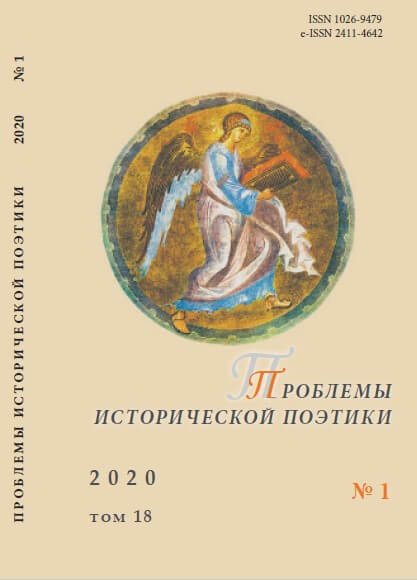«Гетеротопия усадьбы» в романе З. Н. Гиппиус «Роман-царевич» (1913)
“The Heterotopia of Estate” in the Novel by Z. N. Gippius “Roman-Tsarevich” (1913)
Author(s): Olga BogdanovaSubject(s): Christian Theology and Religion, Semiology, Comparative Study of Literature, Russian Literature, Theory of Literature
Published by: Петрозаводский государственный университет
Keywords: estate topos; estate locus; heterotopia of the estate; Silver age; symbolist novel; Z. N. Gippius; D. S. Merezhkovsky; religious revolution; religious community; new religious consciousness;
Summary/Abstract: The article studies the space-semiotic organization of one of the central symbolist novels of the Silver age, associated with the “estate topos” in Russian literature. Most of the action in the “Roman-Prince” by Z. N. Gippius takes place in the 1910s on the territory of country estates in different parts of Russia, as well as in the Western European castle near the Pyrenees, where Russian revolutionaries live. The duality of the Russian revolution manifested as late as in Decembrist movement (the “autocratic” dictatorship of P. I. Pestel and the Christian democratism of S. I. Muravyov-Apostol) echoed in Gippius’s novel in the form of the opposition between Roman Smentsev and Mikhail Rzhevsky, along with his supporters Florenty and Litta. Gippius’s discovery consists in the fact that she found in the field of “estate topos” a meaning that goes back to the activities of the Decembrists-noble revolutionaries of the first quarter of the 19th century, often large landowners. The “Estate topos” appears in the “Roman-Prince” as the topos of the Russian religious revolution in a number of local variations. The ideological and artistic circulation between its three loci unites the Western European castle, reminiscent of the educationist roots of the Russian “estate culture” with its ideal of a free personality, a noble estate of the Golden age, which brings Russia’s first apostles of religious revolution, and eclectic intelligent-landowner estate of the Silver age, the inhabitants of shich are under the evil power of the Antichrist of the revolution, genetically ascending to Stavrogin of the novel “Demons” by F. M. Dostoevsky.
Journal: Проблемы исторической поэтики
- Issue Year: 18/2020
- Issue No: 1
- Page Range: 294-314
- Page Count: 21
- Language: Russian

